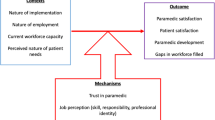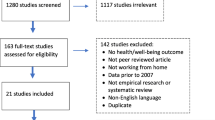Abstract
Changing resident and staff populations, along with political economic reforms, call for new insights into the kinds of skills needed to work in long-term residential care (LTRC). This paper explores the skills of three occupational groups in LTRC: direct care workers, nurses, and doctors. We highlight complexities and ambiguities that exist regarding the training, roles and responsibilities, and integration of these occupational groups, and consider how race and gender relations shape assumptions regarding the skills of different workers. This paper synthesizes presentations and discussions from a workshop titled ‘Skills for Long-term Residential Care,’ held in Toronto, Canada in May 2015. Presentations drew on ethnographic research in LTRC facilities across Canada, the United States, the United Kingdom, Norway, Sweden, and Germany, as well as the practical experience and knowledge of representatives from Canadian unions and professional organizations. We highlight conditions needed to ensure workers have the appropriate skills to care for an aging population, and raise questions to be addressed to develop a sustainable, highly skilled LTRC workforce.
Similar content being viewed by others
Notes
References
Armstrong, P. (2013). Puzzling skills: Feminist political economy approaches. Canadian Review of Sociology/Revue Canadienne de Sociologie, 50(3), 256–283.
Armstrong, P., Banerjee, A., Szebehely, M., Armstrong, H., Daly, T., & Lafrance, S. (2009). They deserve better: The long-term care experience in Canada and Scandinavia. Ottawa, ON: Canadian Centre for Policy Alternatives.
Baines, D., & Cunningham, I. (2013). Using comparative perspective rapid ethnography in international case studies. Qualitative Social Work, 12, 73–88.
Banerjee, A., & Armstrong, P. (2015). Centring care: explaining regulatory tensions in residential care for older persons. Studies in Political Economy: A Socialist Review, 95, 7–28.
Barken, R., Denton, M., Brookman, C., Zeytinoglu, I., & Plenderleith, J. (2015). Home care workers’ skills in the context of task shifting: complexities in care work. Canadian Review of Sociology, 52(3), 289–309.
Birch, S., & Bourgeault, I. L. (2007). Health human resources policy in the 21st century: Addresing the complexities of who does what in the Canadian context. Canadian Public Policy, 33, SIII–SISV.
Bourgeault, I. L., Atanacovick, J., LeBrun, J., Parpia, R., Rashid, A., Winkup, J. (2009). Migrant care workers in an aging society: the Canadian context and experience. McMaster University, University of Ottawa, and Queen’s University: COMPAS.
Bourgeault, I. L., Atanackovic, J., Rashid, A., & Parpia, R. (2010). Relations between immigrant care workers and older persons in home and long-term care. Canadian Journal on Aging, 29(1), 109–118.
Daly, M., & Lewis, J. (2000). The concept of social care and the analysis of contemporary welfare states. British Journal of Sociology, 51(2), 281–298.
Daly, T., & Szebehely, M. (2012). Unheard voices, unmapped terrain: Care work in long-term residential care for older people in Canada and Sweden. International Journal of Social Welfare, 21(2), 139–148.
Daly, T., & Szebehely, M. (2015). Hearing voices, mapping domains: Care workers’ experiences of their work comparing Canada and Sweden. Paper presented in the workshop “Skills for Long-term Residential Care,” sponsored by the Social Sciences and Humanities Research Council, Toronto, ON, 20 May. Available at: http://reltc.apps01.yorku.ca/presentations.
Daly, T., Armstrong, P., & Lowndes, R. (2015). Liminality in Ontario’s long-term care facilities: Private companions’ care work in the space 'betwixt and between.' Competition and Change, 19(3), 246–263.
Dellefield, M. E., Harrington, C., & Kelly, A. (2012). Observing how RNs use clinical time in a nursing home: A pilot study. Geriatric Nursing, 33(4), 256–263.
Glenn, E. N. (2010). Forced to care: Coercion and caregiving in America. Cambridge: Harvard University Press.
Goldmann, M. (2015). Skills in residential long-term care: Some recent developments and debates in Germany. Paper presented in the workshop “Skills for Long-term Residential Care,” sponsored by the Social Sciences and Humanities Research Council, Toronto, ON, 20 May. Available at: http://reltc.apps01.yorku.ca/presentations.
Harrington, C. (2015). Skills for long-term residential care: Nurses. Paper presented in the workshop “Skills for Long-term Residential Care,” sponsored by the Social Sciences and Humanities Research Council, Toronto, ON, 20 May. Available at: http://reltc.apps01.yorku.ca/presentations.
James, B., Lexchin, J., & McGregor, M. (2015). Skills for long-term residential care: Doctors. Paper presented in the workshop “Skills for Long-term Residential Care,” sponsored by the Social Sciences and Humanities Research Council, Toronto, ON, 20 May. Available at: http://reltc.apps01.yorku.ca/presentations.
Kristiansen, M. (2015). Occupational categories in nursing homes: Reflections on Norway and UK. Paper presented in the workshop “Skills for Long-term Residential Care,” sponsored by the Social Sciences and Humanities Research Council, Toronto, ON, 20 May. Available at: http://reltc.apps01.yorku.ca/presentations.
Laxer, K., Jacobsen, F. F., Lloyd, L., Goldmann, M., Day, S., Choiniere, J., Vaillancourt Rosenau, P. (2016). Comparing nursing home assistive personnel in five countries. Ageing International, 41, 62-78.
Mathers, B. (2015). Skills for long-term residential care: Ontarion Nurses Association. Paper presented in the workshop “Skills for Long-term Residential Care,” sponsored by the Social Sciences and Humanities Research Council, Toronto, ON, 20 May.
Palmer, E., & Eveline, J. (2012). Sustaining low pay in aged care work. Gender, Work and Organization, 19(3), 254–275.
Rao, G. (2015). Skills for long-term residential care: CUPE. Paper presented in the workshop “Skills for Long-term Residential Care,” sponsored by the Social Sciences and Humanities Research Council, Toronto, ON, 20 May. Available at: http://reltc.apps01.yorku.ca/presentations.
Rubin, D. (2015). Skills for long-term residential care: OANHSS. Paper presented in the workshop “Skills for Long-term Residential Care,” sponsored by the Social Sciences and Humanities Research Council, Toronto, ON, 20 May. Available at: http://reltc.apps01.yorku.ca/presentations.
Starke, P. (2006). The politics of welfare state retrenchment: A literature review. Social Policy and Administration, 40(1), 104–120.
Vermey, C. 2015. Skills for long-term residential care: Unifor. Paper presented in the workshop “Skills for Long-term Residential Care,” sponsored by the Social Sciences and Humanities Research Council, Toronto, ON, 20 May. Available at: http://reltc.apps01.yorku.ca/presentations.
Vrangbaek, K., Petersen, O. H., & Hjelmar, U. (2015). Is contracting out good or bad for employees? A review of international experience. Review of Public Personnel Administration, 35(1), 3–23.
Author information
Authors and Affiliations
Corresponding author
Ethics declarations
Conflict of Interest
The authors declare no conflict of interest.
Informed Consent
As there is no person or personal data appearing in the paper, there is no one from whom a permission should be obtained in order to publish personal data.
Ethical Treatment of Experimental Subjects (Animal and Human)
This article does not contain any studies with human participants or animals performed by the authors.
Rights and permissions
About this article
Cite this article
Barken, R., Armstrong, P. Skills of Workers in Long-Term Residential Care: Exploring Complexities, Challenges, and Opportunities. Ageing Int 43, 110–122 (2018). https://doi.org/10.1007/s12126-017-9285-7
Published:
Issue Date:
DOI: https://doi.org/10.1007/s12126-017-9285-7




